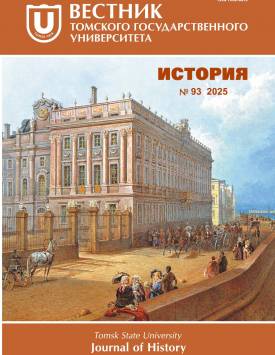Sanctions and their overcoming in Russia in different historical periods
The author, dealing with the problems of the socio-economic development of modern Russia, in recent years has paid close attention to anti-Russian sanctions, their goals and objectives, as well as measures to minimize the consequences of their impact on the economy and social sphere of our country. On the basis of the research, the author has found that the sanctions imposed by Western countries pursue the same main goal as during industrialization and the Cold War: to weaken the country's economy as much as possible, to cause discontent of the masses with the policies implemented by President V. Putin and thereby influence the decisions on Ukraine. The analysis shows that a sharp increase in sanctions pressure occurred after the start of a special military operation in Ukraine, announced by the President of Russia on February 24, 2022. The greatest emphasis in the anti-Russian sanctions is placed on the oil and gas sector of the economy, thanks to which the state budget is largely filled, the military-industrial complex is financed, and funds are invested in other sectors of the real economy and in the social sphere of the country. A number of sanctions packages contained measures aimed at weakening the Russian banking system. This is evidenced by the freezing of almost half of the international (gold and foreign exchange) reserves, the disconnection of the leading banks of our country from the SWIFT payment system and the denial of their lending by the banks of the United States, the European Union and other countries. The President, the Government, the State Duma of the Russian Federation, adequately responding to the sanctions of the Western countries, have been implementing effective measures to minimize their impact on the socio-economic development of our country. This is convincingly evidenced by the facts which the author presents in this article. A historical retrospective of the sanctions of unfriendly states that were applied in different historical periods against our country is presented. The process of minimizing anti-Soviet sanctions is shown, its positive experience is analyzed, which can be creatively used in overcoming anti-Russian sanctions imposed by the United States and its allies, who started an economic and information war after the reunification of Crimea with the Russian Federation and increased sanctions pressure on our country with the start of a special military operation in Ukraine in February 2022. The study of the historical experience of overcoming sanctions, its creative use in modern conditions is not only of great importance, but also has a certain practical significance for public administration in the context of the sanctions policy applied against the Russian Federation by unfriendly countries. The authors declare no conflicts of interests.
Keywords
sanctions,
economics,
public administration,
historical circumstancesAuthors
| Moiseev Vladimir V. | Belgorod State Technological University named after V.G. Shukhov | din_prof@mail.ru |
Всего: 1
References
Галушка А.С., Ниязметов А.К., Окулов М.О. Кристалл роста к российскому экономическому чуду. М.: Наше завтра, 2021. 360 р.
О привлечении специалистов из-за границы: постановление СНК СССР (Протокольное) от 15.02.1927 // Исторические материалы. URL: https://istmat.org/node/28823/(дата обращения: 21.06.2022). _Моисеев В.В. Санкции и их преодоление в России в разные исторические периоды_63.
Ситников А. Первые санкции против России // Свободная Пресса. 2014. URL: http://svpressa.ru/politic/article/100726/ (дата обращения: 21.06.2022).
Съезды Советов Союза Советских Социалистических республик: сборник документов: 1917-1936 гг.: в 3 т. / сост.: Д.А. Гайдуков, А.М. Давидович, С.Л. Ронин. М.: Гос. изд-во юрид. лит., 1960. Т. III: 1922-1936. 399 с.
Моисеев В.В. Власть и бизнес: актуальные проблемы взаимодействия в России. 2-е изд., испр. и доп. М.: Директ-Медиа, 2021. 424 с.
ИТ-специалисты десятками тысяч уезжают из России // Cnews. 2022. 22 марта. URL: https://www.cnews.ru/news/top/2022-03-22_poslableniya_ne_pomogayut (дата обращения: 22.06.2022).
Льготы для IT компаний // Regberry.ru. 2023. 22 нояб. URL: https://www.regberry.ru/malyy-biznes/lgoty-dlya-it-kompaniy (дата обращения: 23.06.2022).
Всемирный банк прогнозирует длительную рецессию в России в случае усиления геополитических рисков // ТАСС. 2014. 24 сент. URL: https://tass.ru/ekonomika/1463540 (дата обращения: 23.06.2022).
Моисеев В.В. Россия в глобальном кризисе. М.: Директ Медиа, 2014. 803 с.
Трамп подписал закон об антироссийских санкциях // РИА Новости. 2017. 2 авг. URL: https://ria.ru/world/20170802/1499630941.html (дата обращения: 21.06.2022).
Боровский Ю.В. Советский и российский ТЭК как объекты западных санкций: политическое соперничество или экономическая конкуренция? // Вестник МГИМО-Университета. 2019. № 3 (66). С. 42-60.
Моисеев В.В. Импортозамещение в экономике России. 2-е изд., испр. и доп. М.: Директ-Медиа, 2022. 304 с.
Харалужный А. Гражданское авиастроение: советское и постсоветское // Военное обозрение. 2020. 24 марта. URL: https://topwar.ru/169354-kogda-ja-vizhu-slomannye-kryljaaviastroenie-sovetskoe-i-postsovetskoe.html (дата обращения: 22.06. 2022).
Михайлова Д. Гражданский сектор авиапромышленности России в 2021 г. // LiveJournal. 2022. URL: https://diana-mihailova.livejournal.com/7465987.html (дата обращения: 22.06.2022).
Анисимова Н. Минфин заявил о заморозке $300 млрд золотовалютных резервов из-за санкций // РБК. 2022. 13 марта. URL: https://www.rbc.ru/economics/13/03/2022/622dd6ee9a7947081b63341c (дата обращения: 23.06.2022).
Фурсеев И. Боррель призвал передать Украине замороженные в ЕС резервы России // РБК. 2022. 9 мая. URL: https://www.rbc.ru/politics/09/05/2022/6278949b9a794754a7db2a67. (дата обращения: 23.06.2022).
Александрова Л. Минфин решил выделить запас драгоценных металлов и камней на крайний случай // Московский комсомолец. 2022. 21 июня. URL: https://www.mk.ru/economics/2022/06/21/minfin-reshil-vydelit-zapas-dragocennykh-metallov-i-kamney-na-krayniy-sluchay.html (дата обращения: 23.06.2022).
Чуприн В. Нефтяное эмбарго: кому Россия будет продавать углеводороды в условиях санкций // Московский комсомолец. 2022. 5 мая. URL: https://www.mk.ru/economics/2022/05/05/neftyanoe-embargo-komu-rossiya-budet-prodavat-uglevodorody-v-usloviyakh-sankciy.html/(дата обращения: 23.06.2022).
Александрова Л. Названа главная неприятность пятого пакета санкций Евросоюза // Московский комсомолец. 2022. 9 апр. URL: https://www.mk.ru/economics/2022/04/09/nazvana-glavnaya-nepriyatnost-pyatogo-paketa-sankciy-evrosoyuza.html (дата обращения: 23.06.2022).
Пашкова Л. Госдума приняла закон о легализации параллельного импорта // РБК. 2022. 21 июня. URL: https://www.rbc.ru/politics/21/06/2022/62b1a5f59a7947b2fc18c233 (дата обращения: 23.06.2022).
Ермакова С. Белоусов оценил объем параллельного импорта за два года в $70 млрд // Ведомости. 2023. 21 дек. URL: https://www.vedomosti.ru/economics/articles/2023/12/21/1012361-obem-parallelnogo-importa (дата обращения: 22.08.2023).
Мишустин призвал активизировать импортозамещение как способ противодействия санкциям // Газета.т. 2022. 1 марта. URL: https://www.gazeta.ru/business/news/2022/03/01/17363251.shtml (дата обращения: 23.06.2022).

